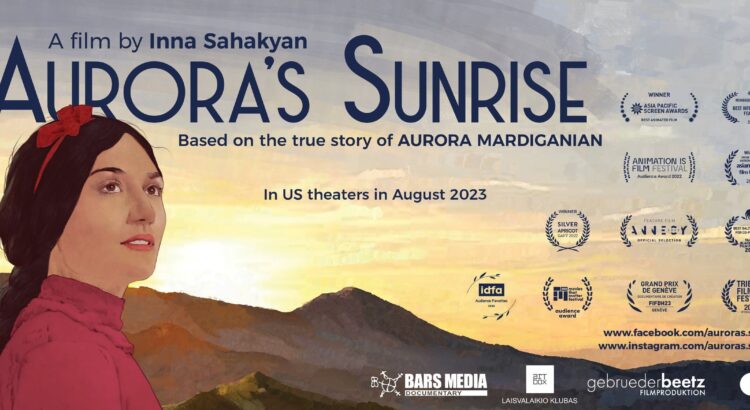3:00pm • Friday, Sept. 29, 2023 • State Theater
Content warning: genocide, violence against the Armenian community
Aurora’s Sunrise, directed by Inna Sahakyan (who was in attendance for a Q&A session at Friday’s screenings), tells the unlikely story of Aurora Mardiganian, a young woman who survived the Armenian genocide of 1915-1923. In 1918, Mardiganian escaped to America and through an unlikely series of events became a silent film star, playing herself in Ravished Armenia (Auction of Souls). The silent film was produced in 1919, purportedly to raise money for Near East Relief, a charitable organization working to protect refugees in the Ottoman Empire during WWI. Through its unique combination of animation, archival footage, and interviews, Aurora’s Sunrise provides a platform for the often-erased history of the Armenian genocide, while raising important questions about ethical storytelling.
For me, exploitation and revictimization were two of the documentary’s most striking motifs. Not only did we witness the horrors Mardiganian faced as a young girl in Armenia, which included watching the murders of her entire family and being repeatedly sold into slavery, but we also saw how she was forced to relive those traumas again and again for an American audience. Filming Auction of Souls was physically grueling, and when Mardiganian broke her ankle in a fall, she was forced to continue acting on it for weeks. Not only did Mardiganian re-enact her two years in exile for the film: At every screening, she shared the details of her story with private audiences of American women, enticing them to donate to Near East Relief. At a turning point in the film, Mardiganian fainted on stage at a speaking engagement. The director of Auction of Souls (who had taken legal guardianship of the young woman) told her she had ruined the event and abandoned her at a convent. Rather than providing a platform for Mardiganian’s own voice, we saw how powerful individuals in Old Hollywood co-opted her story and controlled her personal life.
Aurora’s Sunrise exposes how the Armenian community’s trauma was commodified and minimized for the sake of Hollywood spectacle, under the guise of humanitarian awareness-raising. Mardiganian’s work to spread her story and the realities of the Armenian genocide was highly impactful, raising over 30 million dollars for humanitarian efforts in the Ottoman Empire, but at what cost? The documentary raises essential questions about the ethics of representation: Can narratives of suffering be told without perpetuating harm and revictimization?
Despite the horror and injustice of her circumstances, Mardiganian’s strength and dedication to her community shine throughout the entire documentary. In her Q&A at the end of the film, director Inna Sahakyan prefaced the discussion with the fact that over 100 years after Mardiganian’s story took place, Armenians are facing renewed ethnic cleansing by Azerbaijan. I was struck by the parallels between the director and her subject, both of whom have chosen to convey deeply painful stories to removed audiences, out of a profound commitment to their people. Sahakyan urged moviegoers on Friday to share the film with friends and family, so I am using this opportunity to encourage readers to go watch Aurora’s Sunrise, and prevent this important story from being lost.


